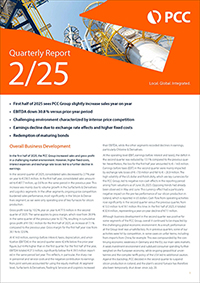PCC subsidiary becomes first silicon producer to receive ISCC certification for carbon footprint
Icelandic silicon metal producer PCC BakkiSilicon hf. is the first company in its sector worldwide to receive certification of its greenhouse gas balance of silicon metal in accordance with the new ISCC Carbon Footprint Certification (CFC) standard. ISCC (International Sustainability and Carbon Certification) is a renowned certification system for verifiably sustainable supply chains. PCC BakkiSilicon hf. is nevertheless under strong economic pressure – and is calling for political support – due to the fact that it operates in direct competition with China, where silicon is produced with CO2 emissions many times higher than at PCC‘s plant in Iceland and in part under conditions of forced labor and then exported at dumping prices.
Following an audit at the production site in Húsavík by an independent certification body, the certificate was issued confirming a greenhouse gas footprint of 3,102.56 kilograms of carbon dioxide equivalent (CO2e) per metric ton of silicon metal as manufactured in the twelve-month reference period from July 1, 2022 to June 30, 2023. PCC BakkiSilicon hf. produces silicon metal in Iceland exclusively using electricity from renewable energy sources (predominantly geothermal energy). The certificate and audit report for PCC BakkiSilicon hf. are published on www.iscc-system.org.
“The fact that our subsidiary as a global pioneer in the industry has been audited in line with the ISCC standard for carbon footprint certification (CFC) confirms the validity of our strategy of setting global standards in climate protection with PCC BakkiSilicon hf.,” explains Dr. Peter Wenzel, Chairman of the Executive Board and CEO of PCC SE, the Duisburg-based parent company of PCC BakkiSilicon hf. “With a certified carbon footprint of 3.1 kilograms CO2 equivalent per kilogram of silicon, our production in Iceland is a factor of around 3.5 below the global industry average of 10.9 kilograms CO2 equivalent – and in our estimation Chinese manufacturers in particular, which dominate the world market with their dumping prices, are still operating with emissions far above this figure.”
Silicon is indispensable for the production of photovoltaic modules and also for other high-tech and climate protection applications. For example, the PCC start-up PCC Thorion GmbH is currently developing a highly efficient battery anode material based on silicon nanopowder. Since silicon production is very energy-intensive, the emissions associated with energy supply play an important role in the overall climate balance of these applications and therefore in their effectiveness in protecting the climate. With its low carbon footprint thanks to a manufacturing regime based on renewable energy sources, PCC BakkiSilicon hf. has set the global benchmark in this regard.
“But despite this, the material produced so efficiently in environmental terms by PCC in Iceland is rarely measured by customers in Europe against criteria such as sustainability or climate protection, but still only against price,” declares Peter Wenzel. “For years, PCC has therefore been calling for support at the political level against unfair competition from cheap silicon produced under conditions that are harmful to the climate and partly in violation of human rights.” Against this background, Wenzel also points out that the construction of the plant in Iceland, which went into operation in 2018, was supported by the German government due to its importance for a raw materials strategy geared to the needs of German industry.
The analysis of the carbon footprint on which the ISCC Carbon Footprint Certificate awarded to PCC BakkiSilicon hf. is based was carried out in accordance with the ISCC guidelines for greenhouse gas calculations and the new certification approach for the carbon footprint of products from silicon metal production. The scope of the certificate covers the system boundaries of “cradle-to-gate”, i.e. the entire production process, including raw material and energy supply, transportation and manufacturing. The reference product is one metric ton of silicon metal produced in 2022 and 2023.

